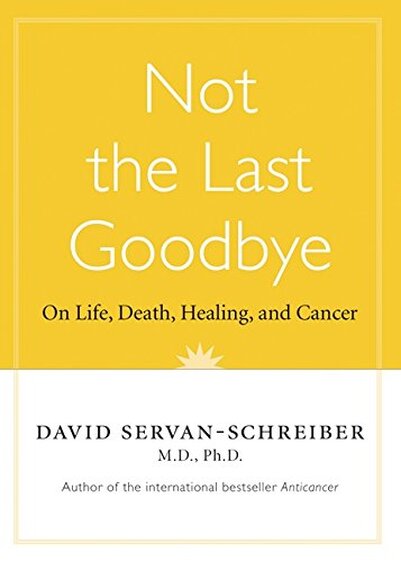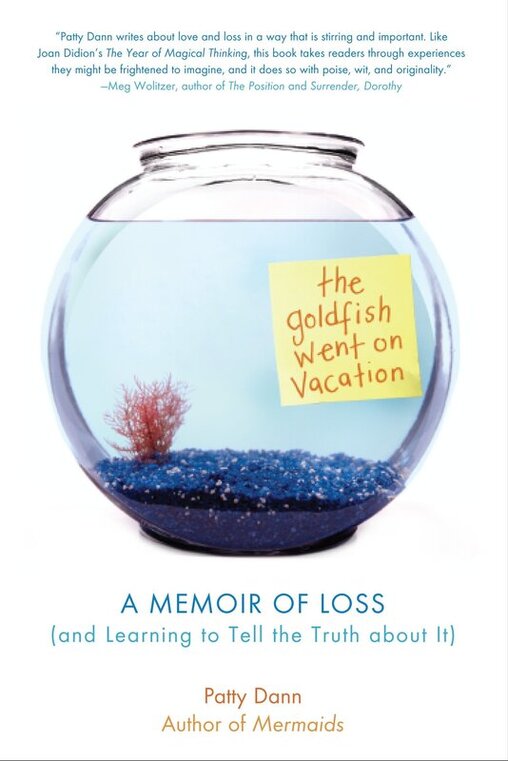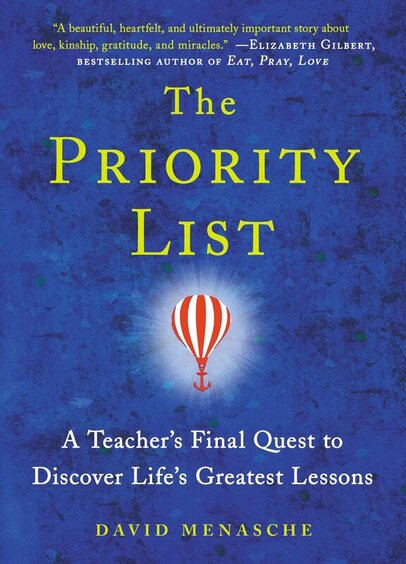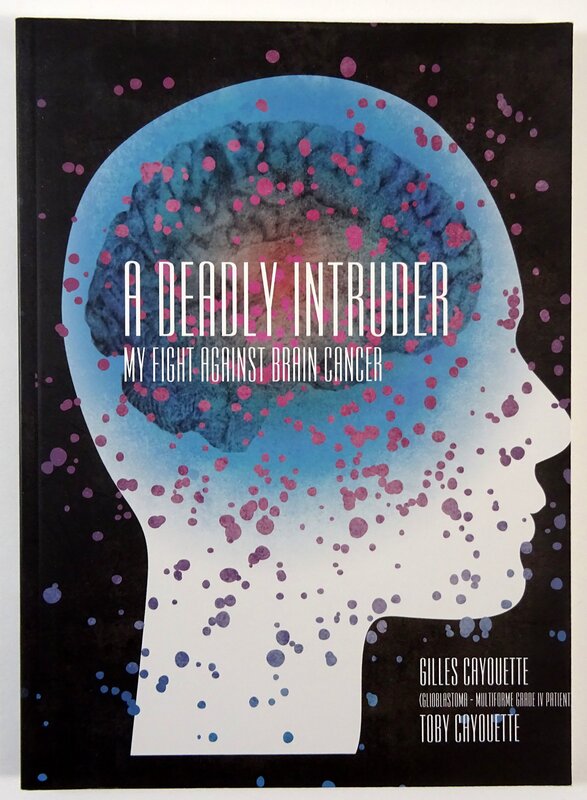I collect and read every brain cancer book I can find. Either books about brain cancer or memoirs written by those going through the experience. Here are my summaries of the books I have read so far.
Soon I will be adding my book to the list!
Soon I will be adding my book to the list!

NOT THE LAST GOODBYE
Dr. David Servan-Schreiber describes his experience after the recurrence of the brain cancer he was diagnosed with 19 years earlier. When I picked up Not the Last Goodbye, I soon realized it was written by the author of the widely acclaimed book, Anticancer, which I had read many years ago. I had followed many of his recommendations on diet and staying healthy. David was a physician, university professor and entrepreneur; after the publication of Anticancer, he was also on the book tour circuit promoting his book. In Anticancer, which I highly recommend, he describes his journey after his initial diagnosis and all that he did to be healthy and survive cancer.
In Not the Last Goodbye, David acknowledges that he didn’t necessarily always practice what he preached in Anticancer. He writes: “I cared so much about promoting my ideas that I forgot to look after myself.” This struck a chord with me. Although it’s been over 15 years since my diagnosis of glioblastoma and I like to think the cancer is gone, I must continue to be mindful of the need to be healthy in all dimensions. The cancer may be gone, but its physical and mental effects linger, both from the tumour and the treatment, and I want to be as healthy as I can. Also, after my diagnosis in 2004, I tried to identify events and actions that had occurred in the preceding years that may have led to the cancer. In fact, I had a specific event in mind that I felt triggered the cancer. This book helped me believe that there is no point in regretting the past—that it makes more sense to focus on and treasure what is good is one’s life.
Not the Last Goodbye is filled with little nuggets of wisdom. The author made it clear that even though he knew that his illness was terminal, he lived every day fully and with hope. He showed me what I do not want to do, which is to ignore the most important things in life. As I have heard from many others diagnosed with brain cancer, we have a new perspective on life. For me, I tend to see the beauty surrounding us more than I did before my diagnosis. And although sitting at my desk in front of the computer is important for my work, I also know how important it is to sit amongst the trees on a hill, as this nourishes my soul and that helps me to stay healthy.
Indeed, David believed that there are many things an individual can do to be healthy in addition to conventional medical treatment. The simplest things can have profound positive effects—“spending time in a forest, on a mountain, or a riverbank brings us something that is wonderfully revitalizing…it helps us to align ourselves with the rhythm of the seasons, to find balance and healing within ourselves.” I am also mindful of the fact that every one of us has only a certain period of time to enjoy the beauty of life. I’ve come to realize that the things that used to trigger anxiety, frustration or anger are quite insignificant in the grand scheme of things. So this book really resonated with me. “We need to nourish our health, our psychological balance, our relationships with others and the planet around us. Together, all these efforts contribute to protecting us—individually and collectively—from cancer, even if there will never be a 100 percent guarantee.” David wrote Not the Last Goodbye in April and May, 2011, and it was published in his native France a month later. It went straight to the top of the bestseller lists – just in time: David died on July 24, 2011. Even to the end of his life he taught us valuable lessons about cancer, life, death and healing.
Not the Last Goodbye Hardcover: 176 pages Publisher: Collins (Nov. 22 2011) Language: English ISBN-10: 1443410888 ISBN-13: 978-1443410885 Product Dimensions: 13.3 x 1.6 x 19 cm Shipping Weight: 222 g Average Customer Review: 5.0 out of 5 stars
Anticancer Paperback: 288 pages Publisher: Collins (Jan. 4 2009) Language: English ISBN-10: 1554682223 ISBN-13: 978-1554682225 Product Dimensions: 15.2 x 1.8 x 22.9 cm Shipping Weight: 386 g Average Customer Review: 4.8 out of 5 stars
Dr. David Servan-Schreiber describes his experience after the recurrence of the brain cancer he was diagnosed with 19 years earlier. When I picked up Not the Last Goodbye, I soon realized it was written by the author of the widely acclaimed book, Anticancer, which I had read many years ago. I had followed many of his recommendations on diet and staying healthy. David was a physician, university professor and entrepreneur; after the publication of Anticancer, he was also on the book tour circuit promoting his book. In Anticancer, which I highly recommend, he describes his journey after his initial diagnosis and all that he did to be healthy and survive cancer.
In Not the Last Goodbye, David acknowledges that he didn’t necessarily always practice what he preached in Anticancer. He writes: “I cared so much about promoting my ideas that I forgot to look after myself.” This struck a chord with me. Although it’s been over 15 years since my diagnosis of glioblastoma and I like to think the cancer is gone, I must continue to be mindful of the need to be healthy in all dimensions. The cancer may be gone, but its physical and mental effects linger, both from the tumour and the treatment, and I want to be as healthy as I can. Also, after my diagnosis in 2004, I tried to identify events and actions that had occurred in the preceding years that may have led to the cancer. In fact, I had a specific event in mind that I felt triggered the cancer. This book helped me believe that there is no point in regretting the past—that it makes more sense to focus on and treasure what is good is one’s life.
Not the Last Goodbye is filled with little nuggets of wisdom. The author made it clear that even though he knew that his illness was terminal, he lived every day fully and with hope. He showed me what I do not want to do, which is to ignore the most important things in life. As I have heard from many others diagnosed with brain cancer, we have a new perspective on life. For me, I tend to see the beauty surrounding us more than I did before my diagnosis. And although sitting at my desk in front of the computer is important for my work, I also know how important it is to sit amongst the trees on a hill, as this nourishes my soul and that helps me to stay healthy.
Indeed, David believed that there are many things an individual can do to be healthy in addition to conventional medical treatment. The simplest things can have profound positive effects—“spending time in a forest, on a mountain, or a riverbank brings us something that is wonderfully revitalizing…it helps us to align ourselves with the rhythm of the seasons, to find balance and healing within ourselves.” I am also mindful of the fact that every one of us has only a certain period of time to enjoy the beauty of life. I’ve come to realize that the things that used to trigger anxiety, frustration or anger are quite insignificant in the grand scheme of things. So this book really resonated with me. “We need to nourish our health, our psychological balance, our relationships with others and the planet around us. Together, all these efforts contribute to protecting us—individually and collectively—from cancer, even if there will never be a 100 percent guarantee.” David wrote Not the Last Goodbye in April and May, 2011, and it was published in his native France a month later. It went straight to the top of the bestseller lists – just in time: David died on July 24, 2011. Even to the end of his life he taught us valuable lessons about cancer, life, death and healing.
Not the Last Goodbye Hardcover: 176 pages Publisher: Collins (Nov. 22 2011) Language: English ISBN-10: 1443410888 ISBN-13: 978-1443410885 Product Dimensions: 13.3 x 1.6 x 19 cm Shipping Weight: 222 g Average Customer Review: 5.0 out of 5 stars
Anticancer Paperback: 288 pages Publisher: Collins (Jan. 4 2009) Language: English ISBN-10: 1554682223 ISBN-13: 978-1554682225 Product Dimensions: 15.2 x 1.8 x 22.9 cm Shipping Weight: 386 g Average Customer Review: 4.8 out of 5 stars
|
THE GOLD FISH WENT ON VACATION
WHILE BROWSING THROUGH my bookshelf on books to help my writing, I came across a memoir by Patty Dann called The Butterfly Hours—Transforming Memories into Memoir. In this book, she mentions that her husband had passed away from brain cancer. That led me to search online for other books that Patty Dann had written, and I found The Goldfish Went on Vacation, which I purchased immediately. I was interested in this book because I am writing a memoir about my own brain cancer experience. The book is a four-part narrative with short chapters, some only a few pages long, so it’s an easy read. The fact that the book is written from Patty’s perspective was new for me, as the other brain cancer books I’ve read were written by the person with cancer. The memoir recounts how Patty and Willem met in a New York synagogue, married and then adopted a baby boy from Lithuania named Jake. When Jake was 3 years old, Willem was diagnosed with a glioblastoma (the same diagnosis I have). We learn how Patty dealt with many challenges and emotions as she cared for her husband and son. This book gave me some insight into the effects that a serious illness diagnosis can have on a family and how difficult this can be for family caregivers. I found myself recalling my attempts at humour when I was diagnosed, and how these fell flat as my family struggled with their fears and anxiety. I wondered if I could have been as strong as my twin brother if he’d been diagnosed with cancer, and I had been his caregiver. I learned a lot from this book and was able to appreciate how much my family had to conceal their own feelings so that they could show me love, strength and positivism. As I read this book, I sometimes wondered if the author was in denial about her husband’s illness, but then I realized she had to remain calm and focused on overcoming her fears. She had to summon up the courage to support her dying husband and prepare her young son for the impending loss of his father. Throughout her memoir, Patty showed me that when a person gets cancer, it has profound effects on their loved ones. Patty cared for her husband even though he was a different person, with changes in his personality, speech, memory and thinking. She had to balance caring for him with caring for her son. And she also had to care for herself in all of this. I recommend this book to anyone interested in learning how one deals with a loved one’s serious illness, especially when it’s brain cancer. It is an excellent book for caregivers because it demonstrates how you can find strength in hardship and accept a terrible situation. Hardcover:144 pages Publisher: Trumpeter; 1 edition (Jan. 9 2007) Language: English ISBN-10:1590304284 ISBN-13:978-1590304280 Product Dimensions:13.6 x 1.9 x 19.8 cm Shipping Weight:272 g |
THE PRIORITY LIST
|
I ENJOYED THIS BOOK by a high school English teacher, David Menasche who had a profound influence on his students’ attitudes about life. Early on in the book it is clear that he was passionate about his role as a teacher and aimed to have a positive effect on his students. One of his techniques was to engage his students to develop a “priority list” of guiding ideas and principles that were important to them. In 2006, he was diagnosed with a glioblastoma and ultimately withdrew from teaching as the diagnosis took its toll on his memory, vision and mobility. When he could no longer work, he embarked on a tour throughout the United States, meeting his students from previous years. Through his travels and the rekindling of relationships with former students, he learned how their priority lists changed over the years and also how we all struggle to achieve our goals in life. One thing that I noticed while reading the book is the lack of attention he gave to his wife compared to his students. This seemed to be partly due to what he had been through with the cancer and how this drove him in new directions. This made me think of how the experience with cancer can create new goals and inspirations that affect not only the patient, but also his or her loved ones. It made me consider how much my cancer experience affected my own personal relationships. I wondered if the changes in my relationships were due to my new priorities and attitudes, or to side effects of my disease and treatment. What do others believe? The author passed away in late 2014, but I understand that Warner Brothers is interested in producing a movie about the book with Steve Carell playing the author. I recommend the book as it is well written and thought-provoking. Author: David Menasche Touchstone Press, 240 pages ISBN 9781476743448; January 2014 |
A DEADLY INTRUDER - MY FIGHT AGAINST BRAIN CANCER
|
I FOUND THIS BOOK INSPIRING, easy to read, and well written. It's actually the first book I read after my diagnosis and it gave me hope and comfort.
Four years after his diagnosis with a glioblastoma, Gilles Cayouette describes his experience living with a brain tumour and includes his techniques for dealing with the diagnosis and its treatment. For example, he writes about very practical things that helped him, such as having his wife with him when he met with an oncologist or nurse. This allowed him to relax and focus on the discussion while his wife took notes and added her own questions. The author has good support from family, but has found the attitude of his physicians sometimes stifling, in that they do not offer the possibility that he might be a survivor. One thing that stood out for me in the book was the author’s constant effort to fight the cancer and become a long term survivor, while not denying the seriousness of the disease. Some people do survive; why couldn’t he be one of them? He seems to feel there is not enough emphasis by oncologists on those patients who live a long time with a diagnosis of glioblastoma. His belief that some types of glioblastoma are more sensitive to treatment than others gives him hope for a better outcome for himself. Gilles recounts how he loves the sunrise, which represents a new day and the chance to start again. There’s a lot of positivity that comes out in this book. He feels that while his disease may not be curable, there is no point in focusing on this, and he might as well be happy with the time he does have. He says “it was better to use the energy [he] had fighting the intruder, rather than on refusing to accept his condition.” He comes to realize that even though he can no longer do some things he enjoyed, he is able to make some changes in order to continue doing other things. He can see the positive aspects of his cancer experience, such as being able to spend more time with this wife and family. He discusses his involvement in the Montreal Spring Sprint, a charitable run for the Brain Tumour Foundation of Canada. This gave him an activity, a focus, and something he could do to give back to the community. I found many similarities between the experience of the author and my own and I managed to contact him. We’ve had a number of conversations and he is doing well. His story is inspiring and you feel how hard he has fought, how strong his desire is to be with his family, to live longer, and to be ready to do whatever he has to do in order to make that happen. Author: Gilles Cayouette, Toby Cayouette. Québec: Celestia Lwms Corp. Editions, 2008. ISBN: 9780981047515 |


